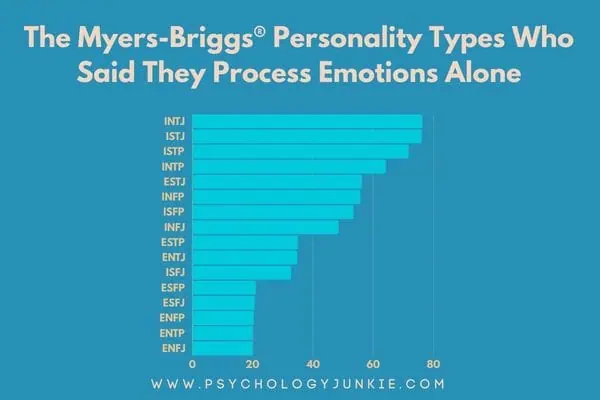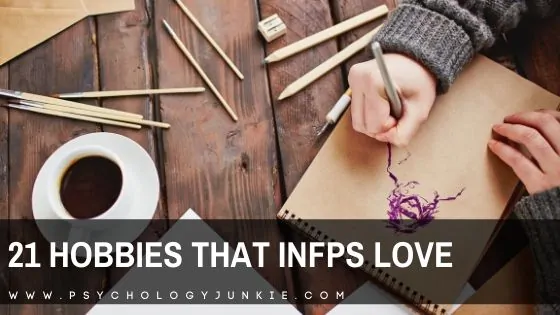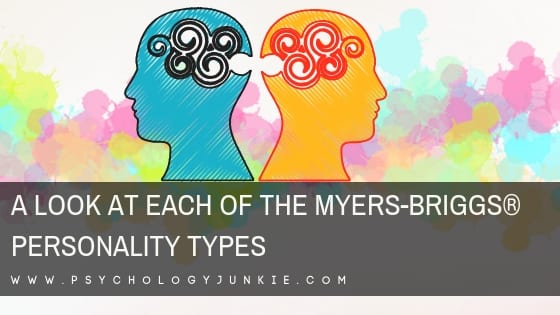The Personality Types Most Likely to Keep Their Feelings to Themselves
You know that feeling when life just throws you a curveball? Maybe you’ve had a terrible day—your boss micromanaged you into oblivion, the cat knocked your coffee onto your favorite book, and someone sent you yet another vague “we need to talk” text. By the end of it, your emotions are bubbling up and you feel like you’re about to explode.
So, what do you do? Do you retreat to your room, shut the door, and untangle the chaos in your head? Or do you pick up the phone and call a friend who knows how to listen without judging your poor life choices?

It turns out, your Myers-Briggs® personality type might hold the answer.
In a recent survey I conducted, I asked people whether they prefer to process their feelings alone or with another person. The answers they could choose from were “Alone,” “With someone as a sounding board,” or “50/50.” 6,319 people have responded as of today (and if you want to add your voice to the survey you can do so here). If you’ve ever wondered whether your way of emotionally processing is just you being weird or if it’s written into the fabric of your personality, keep reading. The answers might surprise you.
Not sure what your personality type is? Take our new personality questionnaire here. Or you can take the official MBTI® here.
Table of contents
- Why Do Some Personality Types Prefer Solitude?
- The 4 Most Emotionally Reserved Types
- 1. INTJ (76.35% say they process feelings alone)
- 2. ISTJ (76.09% say they process feelings alone)
- 3. ISTP (71.79% say they process feelings alone)
- 4. INTP (64.18% say they process their feelings alone)
- The Rest of the Personality Types:
- ESTJ (56.25% say they process feelings alone)
- INFP (55.74% say they process feelings alone)
- ISFP (53.49% say they process feelings alone)
- INFJ (48.47% say they process feelings alone)
- ESTP (35% say they process feelings alone)
- ENTJ (34.73% say they process feelings alone)
- ISFJ (32.73% say they process feelings alone)
- ESFP (21.05% say they process feelings alone)
- ESFJ (20.69% say they process feelings alone)
- ENFP (20.41% say they process feelings alone)
- ENTP (20.05% say they process feelings alone)
- ENFJ (20% say they process feelings alone)
- What Do You Think?
Why Do Some Personality Types Prefer Solitude?

Ever notice how some people seem to get energized by processing their emotions in a crowd, while others look like they’d rather be on a deserted island with a journal and a pen? That difference often comes down to personality type—and specifically, a person’s introversion, extroversion, and thinking versus feeling preferences.
For starters, introverts (I-types) tend to recharge by being alone. It’s not that they hate people (okay, maybe after a long day, they’re temporarily not fans), but they need quiet to sort through their thoughts and emotions. Processing feelings for an introvert is like untangling a giant knot: you need space, patience, and the right tools—not someone hovering over your shoulder saying, “Have you tried just pulling harder?”
On the flip side, extroverts (E-types) often find clarity by talking things out. Some extroverts might not even know what they’re feeling until they’ve shared it with someone else—because for them, emotions tend to unravel more smoothly in conversation. I once coached an ESFJ who said, “If I’m not talking about my feelings, I feel like their just controlling me without making sense.”
Then there’s the Thinking (T) vs. Feeling (F) axis. Thinkers approach emotions a bit like a puzzle: there’s a logical solution somewhere in the mess, and they’re determined to find it—usually on their own. One INTP I worked with told me they needed “at least a week” to process a breakup before they could even think about discussing it. “I’m not emotionally ready,” they explained. “But more importantly, I haven’t formed my argument about why this breakup is their fault.” (INTP humor, not meant to be taken seriously in this context.)
Feelers, on the other hand, lean into the emotional experience itself. Processing for them sometimes means sharing their feelings with someone who understands and getting support or validation.
And let’s not forget cultural factors: society sometimes praises emotional independence—while unfairly branding more sensitive types as “too emotional.” And certain families see emotional sharing as “weak” while others find it “brave.” So there are certainly factors outside of personality that can influence how open we are to expressing our feelings as well.
The 4 Most Emotionally Reserved Types
1. INTJ (76.35% say they process feelings alone)
Unsurprisingly INTJs top the list of emotionally reserved types. Their natural tendency to process feelings alone is rooted in their cognitive makeup, which prioritizes deep reflection, efficiency, and self-reliance. Here’s how their cognitive functions influence how they share their feelings:
- Introverted Intuition (Ni): INTJs’ dominant function loves patterns, connections, and the big picture. When emotions hit, Ni takes over, asking, “What does this mean? How does it fit into my life’s grand plan?” It’s deep, but it’s also slow. Processing emotions for an INTJ is quiet, deliberate, and requires everything else to be tuned out.
- Extraverted Thinking (Te): Te brings a no-nonsense, “Let’s fix this” vibe. Emotions that can’t be logically solved? They may simply put them on the backburner till they can get alone.
- Introverted Feeling (Fi): This quiet, tertiary function is all about deeply felt personal values. Fi is why INTJs take their emotions seriously—but only privately. Sharing? That’s risky. Then everyone can share their own opinions, and frankly, the INTJ doesn’t often feel they need others’ opinions on what they feel. If they open up, it means they’ve thought it through a lot.
What This Looks Like in Real Life:
- They’ll disappear into “thinking mode” after something emotional happens.
- If they do open up, they probably deeply value you as a friend or partner (they don’t share their feelings with just anyone).
- Journaling or solo walks are more likely to be their therapy—not venting sessions.
How to Support an INTJ Friend:
- Give them space. They need time to make sense of their feelings. Don’t take their quiet as rejection.
- Be a calm presence. When they’re ready to talk, listen without interrupting or “fixing.”
- Don’t push. Asking, “Are you okay?” repeatedly is like poking a bear. Just… don’t.
Key Takeaway:
INTJs aren’t unemotional—they just keep their feelings on lockdown until they’ve analyzed every angle. If they trust you enough to share, congratulations—you’ve unlocked a rare achievement.
Find out more about INTJs: The Dark Side of the INTJ Personality Type
2. ISTJ (76.09% say they process feelings alone)
If you’ve ever watched NBC’s Brooklyn 99 you’ve seen a pretty stereotypical ISTJ: Captain Raymond Holt. Holt is disciplined, methodical, and reserved—handling emotions with the same care and precision he applies to filing a police report. He feels deeply, sure, but those feelings are tucked neatly behind a calm exterior. If you haven’t seen Brooklyn 99, then just imagine a strict, serious, responsible captain quietly doing his best to bring order to an unruly team of cops.
Here’s how their cognitive functions influence their approach to feelings:
- Introverted Sensing (Si):
ISTJs’ dominant function is based on reflection and personal experience. When emotions arise, Si takes a quiet step back, searching for context. “Have I felt this way before? What happened last time? What can I learn from this?” It’s all about grounding themselves in what they know. Emotions, for an ISTJ, are like items in a box—they’ll carefully sort through them alone, one by one, before deciding what’s worth keeping and what needs to go. - Extraverted Thinking (Te):
Like their INTJ cousins, ISTJs use Te to approach emotions pragmatically. Te asks, “What’s the problem here, and how do we fix it?” If the answer isn’t immediately clear, they’ll compartmentalize their feelings until they have time to process them fully—alone, of course. One ISTJ I worked with described this perfectly: “Crying in public? Hard pass. I’ll deal with it when I get home.” - Introverted Feeling (Fi):
Tucked away in the tertiary slot, Fi gives ISTJs a deep sense of personal values and quiet emotional intensity. Fi in ISTJs operates like a personal code—private, unshakable, and not up for public debate. They might feel deeply, but they’re not about to wear those feelings on their sleeve.
What This Looks Like in Real Life:
- After an emotional event, ISTJs may retreat to their routines (or their garage) to sort through their feelings alone.
- They’re unlikely to vent, but you might catch them writing in a journal or having an intense conversation—with themselves.
- If they do share their feelings, it’ll be a carefully considered summary, not an emotional word dump.
How to Support an ISTJ Friend:
- Respect their process. ISTJs need time and space to think through their emotions before talking. Don’t rush them.
- Offer practical help. If they seem overwhelmed and stress, help out with some practical chores or bring them a favorite snack.
- Be steady. If they do decide to open up, listen calmly and offer reassurance without prying too much.
Key Takeaway:
ISTJs process emotions like they manage the rest of their lives—quietly, methodically, and with a sense of purpose. They’re not cold; they just prefer to keep their feelings organized and under control. If they trust you enough to share their emotions, you’ve earned a rare spot in their inner circle.
Discover more about ISTJs: 10 Things You Crave Every Day as an ISTJ Personality Type
3. ISTP (71.79% say they process feelings alone)
ISTPs are the cool-headed troubleshooters of the personality world, quietly dismantling problems and figuring out how things work. Emotions? Well, they’re more like an untamed toddler barging into the workshop—messy, loud, and not particularly helpful. In short, ISTPs aren’t the biggest fans. ISTPs aren’t ones to dwell on feelings, preferring instead to focus on logic, practicality, and experience. But just because they don’t talk about their emotions doesn’t mean they don’t feel them—they’re just more comfortable letting those emotions simmer quietly in the background (as long as they can).
Here’s how their cognitive functions influence their emotional processing style:
- Introverted Thinking (Ti):
Ti, their dominant function, thrives on logic and a precise understanding of the world and how it all works. When emotions arise, Ti steps in, asking, “What components are at play? Does it logically make sense to feel this way” If the emotion can’t be analyzed or rationalized in a logical way, ISTPs might shove it into a mental filing cabinet labeled “Not Worth the Energy (Yet).” This analytical approach helps them maintain their signature calm, but it also means emotions can pile up if left unchecked. - Extraverted Sensing (Se):
As their auxiliary function, Se keeps ISTPs grounded in the here and now. It helps them stay present and manage emotions through action—whether it’s working on a project, going for a run, or hiking a challenging mountain peak. If ISTPs are stressed or overwhelmed, you’ll likely find them recharging through hands-on activities. One ISTP I worked with swore by fixing old cars! - Extraverted Feeling (Fe):
As their inferior function, Fe is like an emotional wild card—unpredictable and hard for ISTPs to control. While they have a natural desire for connection and understanding, they struggle to access or express their feelings, often viewing them as unnecessary distractions. When Fe does show up, it’s often in moments of stress, and it can feel overwhelming.
What This Looks Like in Real Life:
- ISTPs will often focus on problem-solving to deal with emotional situations—anything from fixing a leaky faucet to solving a Sudoku puzzle.
- They might seem emotionally detached, but that’s because emotions feel messy and vague to them, so it’s hard for them to verbalize them to others.
- If stress builds up, they might have an uncharacteristic emotional outburst, surprising both themselves and others.
How to Support an ISTP Friend:
- Be patient. Don’t badger them about their feelings; let them open up when they’re ready.
- Respect their independence. Give them space to process emotions on their own, and don’t take their quiet moments personally.
- Stay calm. Overly emotional reactions can push them into “grip stress,” where they feel overwhelmed and emotionally out of control.
- Let them vent. Most ISTP’s feel awkward venting, but sometimes they need to unload their feelings without fear of them being taken the wrong way or over-analyzed. When they do vent, expect it to be messy. Don’t take it all personally or seriously. Often times after they’ve vented they can better understand the emotions and feelings they want to keep, versus those they want to discard.
Key Takeaway:
ISTPs aren’t emotionally detached—they’re just private and practical, preferring to process feelings through action and logic rather than long discussions about feelings they may struggle to find words for. Respect their space, appreciate their practical strengths, and know that when they do open up, it’s a rare and genuine sign of connection.
Find out more about ISTPs: 5 Reasons Why You’ll Need an ISTP in a Zombie Apocalypse
4. INTP (64.18% say they process their feelings alone)
INTPs often live in a world of ideas and theories rather than feelings. Emotions, to an INTP, can feel like an unwelcome pop-up ad—distracting, intrusive, and occasionally nonsensical. It’s not that they don’t have emotions—they absolutely do—but they tend to approach them like a puzzle to solve or a problem to analyze. When feelings surface, INTPs often find themselves trying to rationalize them: “Why am I feeling this way? Does this even make sense? Is this just hunger disguised as existential dread?”
Here’s how their cognitive functions influence their emotional world:
- Introverted Thinking (Ti):
As their dominant function, Ti drives INTPs to prioritize logic and precision. When emotions arise, Ti immediately steps in to analyze and compartmentalize them. INTPs often question their feelings, trying to identify the root cause and discard anything that doesn’t align with their logical framework. One INTP respondent commented, “Feelings are like bad code—they need debugging before they make sense.” - Extraverted Intuition (Ne):
Ne, their auxiliary function, opens the door to endless possibilities and connections. While this can make INTPs creatively explore their emotions, most of the time it works to support Introverted Thinking. This means they’re more focused on creatively understanding how the universe works than why they feel a certain way. - Extraverted Feeling (Fe):
As their inferior function, Fe is both a weakness and a source of occasional insight for INTPs. Fe gives them a desire for connection and harmony, but it’s not usually their strong suit. Sharing feelings can feel clunky and awkward, like trying to use a tool they’ve never quite mastered. And many times INTPs feel like their emotions are vague and convoluted; hard to verbalize or understand.
What This Looks Like in Real Life:
- INTPs may dismiss their feelings initially, trying to “logic their way out” of emotional experiences.
- When overwhelmed, they might withdraw into solitary activities, like reading, gaming, or researching.
- If they open up about their feelings, it might be messy. Expect them to redact things they’ve said as they reach more clarity.
How to Support an INTP Friend:
- Encourage external processing. Let them vent without judgment, even if their feelings seem messy or inconsistent—they’re figuring it out as they go.
- Focus on curiosity, not intensity. Approach their emotions with questions like, “What do you think this feeling is trying to tell you?” rather than diving into heavy emotional conversations.
- Give them space. INTPs often need solitude when they’re emotionally overwhelmed. Don’t pressure them to respond right away.
Key Takeaway:
INTPs approach emotions like they approach life—thoughtfully, logically, and at their own pace. While they might not naturally gravitate toward emotional expression, they value connections that allow them to process feelings in their unique, analytical way. Respect their independence, appreciate their creativity, and know that when they choose to share their inner world, it’s a rare and meaningful glimpse into their complex mind.
Discover more about INTPs: The Dark Side of the INTP Personality Type
The Rest of the Personality Types:
Now let’s break down some of the results of the other twelve personality types. These sections will be a bit briefer, but I think still helpful. Let’s get started!
ESTJ (56.25% say they process feelings alone)
For ESTJs, emotions often feel like an unruly toddler throwing a tantrum in the middle of their well-organized to-do list. They’re driven by action, efficiency, and results, so sitting with their feelings can seem… inefficient. But here’s the catch: ignoring emotions doesn’t make them disappear—it just guarantees they’ll show up later, louder and messier. When ESTJs repress their feelings for too long and then extreme or chronic stress hits, those feelings can erupt in an uncharacteristic way. They may retreat from the world, dwelling on feelings of inadequacy or loneliness, while others simply explode and take out their blame on others.
Quick Tips for ESTJs:
- Schedule it. Set aside 10 minutes to reflect on your emotions—no distractions, just you and your thoughts.
- Write it down. Treat it like a report: What happened, how you felt, and what to do next.
- Get moving. Physical activity helps release tension and clears your mind for reflection.
INFP (55.74% say they process feelings alone)
INFPs live in a world of deep emotions and personal values, often diving into their feelings like they’re an ocean to explore. But here’s the thing: because their emotions run so deep, they often need time alone to fully understand them. Sharing their inner world too soon might feel like handing over a fragile, half-finished masterpiece to someone who might not appreciate it.
Quick Tips for INFPs:
- Cancel the noise. Block out distractions and give yourself uninterrupted time to reflect. Ask, “What have I been too busy—or too afraid—to face?”
- Dive into your values. Write down what truly matters to you. If this were your last day on earth, how would you live differently?
- Express yourself creatively. Paint, write, or play music to channel your emotions. Creativity often unlocks feelings that words can’t.
- Reconnect with your purpose. Focus on how your emotions align with your core values. Are they guiding you toward something meaningful?
Discover more about INFPs: How INFPs Say “I Love You”
ISFP (53.49% say they process feelings alone)
ISFPs are deeply in touch with their emotions, but they don’t wear them on their sleeve. Instead, they hold their feelings close, exploring them privately through experiences or creative outlets. Sharing their emotions too soon can feel intrusive, like someone you barely know asking you to share your most embarrassing moment. For ISFPs, feelings aren’t just analyzed—they’re felt and experienced in a tangible way through art, dance, music, or some other physical form.
Quick Tips for ISFPs:
- Experience your emotions. Go for a walk, listen to music, or engage in hands-on creativity like painting or sculpting to process your feelings through action.
- Take your time. Don’t let anyone rush you into sharing your emotions before you’re ready. It’s okay to reflect and analyze first.
- Focus on the present. Ground yourself by noticing how your body feels—stretch, breathe, and let your senses guide you.
- Express yourself creatively. Use colors, textures, or movements to channel your feelings into something tangible and meaningful.
Find out more about ISFPs: The ISFP Fi-Ni Loop
INFJ (48.47% say they process feelings alone)
INFJs often feel like emotional sponges, soaking up everyone else’s feelings until (at times) they don’t know what’s theirs anymore. If they don’t get quiet time to reflect, they risk burnout or emotional overload. But it can be a challenge for them to speak up for themselves and put their needs first. Many times they feel “selfish” if they prioritize themselves, and many have to pause and realize that their needs are just as important as anyone else’s and that they are just as human as everyone else.
Quick Tips for INFJs:
- Find solitude. Step away from people and their emotions to figure out which feelings are your own.
- Write it down. Journaling helps you process and sort through the meaningful versus the noise.
- Talk it out. Once you’ve had alone time, share your thoughts with someone you trust for feedback.
Find out more about INFJs: 10 Reasons Why INFJs Feel Misunderstood
ESTP (35% say they process feelings alone)
ESTPs are doers, not dwellers, so sitting with emotions can feel like being stuck in a traffic jam when they’d rather be speeding toward the next adventure. They tend to channel their feelings into action, whether that’s hitting the gym, tackling a project, or just staying busy. But here’s the thing—ignoring emotions for too long can cause unexpected blowups or impulsive decisions they might regret later.
Quick Tips for ESTPs:
- Move while you process. Walk, drive, or work out to reflect on your feelings in a way that feels productive.
- Talk it out. Vent to a trusted friend or mentor who won’t judge or try to fix things for you.
- Let music guide you. Listen to songs that match your mood—it’s a great way to connect with emotions you might not easily verbalize.
ENTJ (34.73% say they process feelings alone)
ENTJs are natural leaders, and emotions often feel like something to manage rather than experience. Productivity and efficiency are the name of the game for ENTJs, and something about emotions just doesn’t feel cut-and-dry enough for them. But even the most decisive ENTJ can’t simply power through feelings indefinitely. When stress builds up, all those repressed emotions can burst out in ways that feel uncharacteristic, leaving them (and everyone else) wondering what just happened.
Quick Tips for ENTJs:
- Schedule emotional check-ins. Block off time to reflect on what’s weighing on you—it’s just as important as managing your team or projects.
- Find a safe outlet. Talk to someone you trust who can handle your intensity without judgment.
- Recognize your emotions. Don’t label them as good or bad. See them as experiences that can help you understand yourself and your values better.
ISFJ (32.73% say they process feelings alone)
ISFJs often put everyone else’s needs before their own. But they also use a process called Extraverted Feeling, which means they process their emotions best in an external way; writing them down, talking them out, or even writing a song or poem about them. The hard part is finding someone they trust enough to really confide in. Time, loyalty, and support are essential qualities they look for in somebody to share their feelings with.
Quick Tips for ISFJs:
- Ask yourself first. Take a moment to ask, “How am I really feeling? What do I need?” before focusing on others.
- Write it out. Journaling helps you organize and understand your emotions without interruption.
- Find a sounding board. Sharing your feelings with someone supportive can help lighten the load.
Discover more about ISFJs: The Two Sides of the ISFJ Personality Type
ESFP (21.05% say they process feelings alone)
ESFPs are people of action and enthusiasm, but even the life of the party needs time to process deeper emotions. When they ignore their feelings, they risk burnout or becoming overwhelmed. Because ESFPs use a process called Introverted Feeling, they often need to step away and be alone to really process. Quiet reflection combined with creative outlets helps ESFPs sort through emotions and recharge.
Quick Tips for ESFPs:
- Step away from the noise. Take a break from the commotion to focus on how you’re feeling.
- Create something. Paint, dance, or even doodle to process emotions in a playful way.
- Exercise. Getting your body moving and expending some energy solo can help you to process challenging or intense emotions. Simultaneously, it can help them to reduce stress and improve resilience.
ESFJ (20.69% say they process feelings alone)
ESFJs need community and friendship to really get their feelings out there and process them. They enjoy connecting with others over shared feelings and giving and receiving emotional support and validation. The hard part for them is dealing with messy emotions that might invite judgment. This is why journaling or even audio recording their emotions and listening back to them can be crucial. Because ESFJs are Extraverted Feeling types, having a way to externally process is key. When they hear their feelings out-loud they can more aptly process them and understand them.
Quick Tips for ESFJs:
- Separate yours from theirs. Reflect on which emotions belong to you and which ones you’ve absorbed from others.
- Talk it out. Verbalizing your feelings with someone you trust helps sort the meaningful from the noise.
- Jot it down. Journaling gives you clarity in a private, low-pressure way.
ENFP (20.41% say they process feelings alone)
ENFPs are creative, energetic, and full of ideas, but when emotions hit hard, they need quiet time to make sense of it all. Without that space, feelings can spiral into overthinking or restlessness. Reflection and creative expression give ENFPs clarity and balance. At the same time, as extroverts they also want to find connection and understanding with others. Many ENFPs (57.14%) said they prefer a mixture of alone time and speaking with others to process their feelings.
Quick Tips for ENFPs:
- Unplug and unwind. Step away from distractions and spend time alone with your thoughts.
- Get creative. Journal, paint, or even try finger-painting—it doesn’t have to be perfect, just let it out.
- Practice meditation. Quiet down your mind and center yourself on your breathing and the present moment. This process can help you to more effectively manage emotions without distracting from them.
Discover more about ENFPs: How ENFPs Say “I Love You”
ENTP (20.05% say they process feelings alone)
ENTPs are quick thinkers, often bouncing between ideas and debates rather than sitting with their emotions. But even they need time to process feelings, especially when emotions threaten to derail their usual optimism. The challenge is that their personal feelings can feel vague and hazy, difficult to even find words for. When people ask them how they’re feeling, sometimes they feel lost for words (something that is pretty rare for an ENTP).
Quick Tips for ENTPs:
- Externalize it. Even if you don’t know what you’re feeling, try blurting out everything on your mind. Make sure you only do this with someone you trust who won’t take it all too personally until you’ve had a chance to really process, analyze, redact, and clarify.
- Write without editing. Let your emotions spill onto the page—clarity often comes after the chaos.
- Move with purpose. Physical activity, like walking or jogging, helps you process and reflect.
ENFJ (20% say they process feelings alone)
ENFJs are the empaths and mentors of the personality world, often more focused on others’ emotions than their own. When they do take time to process their feelings, it’s usually through external means—talking, writing, or even dancing it out. The challenge? Their natural tendency to prioritize others’ needs and emotions can make them hesitate to fully explore their own emotional world.
Quick Tips for ENFJs:
- Speak your feelings aloud. Whether it’s to a trusted friend or into the voice memo app on your phone, verbalizing your emotions helps you sort through them.
- Write to reflect. Journaling lets you process without feeling the pressure to sound polished or resolved.
- Revisit your “why.” Reflect on how your emotions align with your values and purpose—it brings clarity and peace.
Find out more about ENFJs: A Look Inside the ENFJ Mind
What Do You Think?
Was this article helpful for you? Do you have any insights or tips that would be helpful to others who share your personality type? Let us and other readers know in the comments! Explore more about your personality type in our eBooks, Discovering You: Unlocking the Power of Personality Type, The INFJ – Understanding the Mystic, The INFP – Understanding the Dreamer, and The INTJ – Understanding the Strategist.

Subscribe to Our Newsletter

Want to discover more about personality type? Get the inside scoop with Susan Storm on all things typological, along with special subscriber freebies, and discounts on new eBooks and courses! Join our newsletter today!











